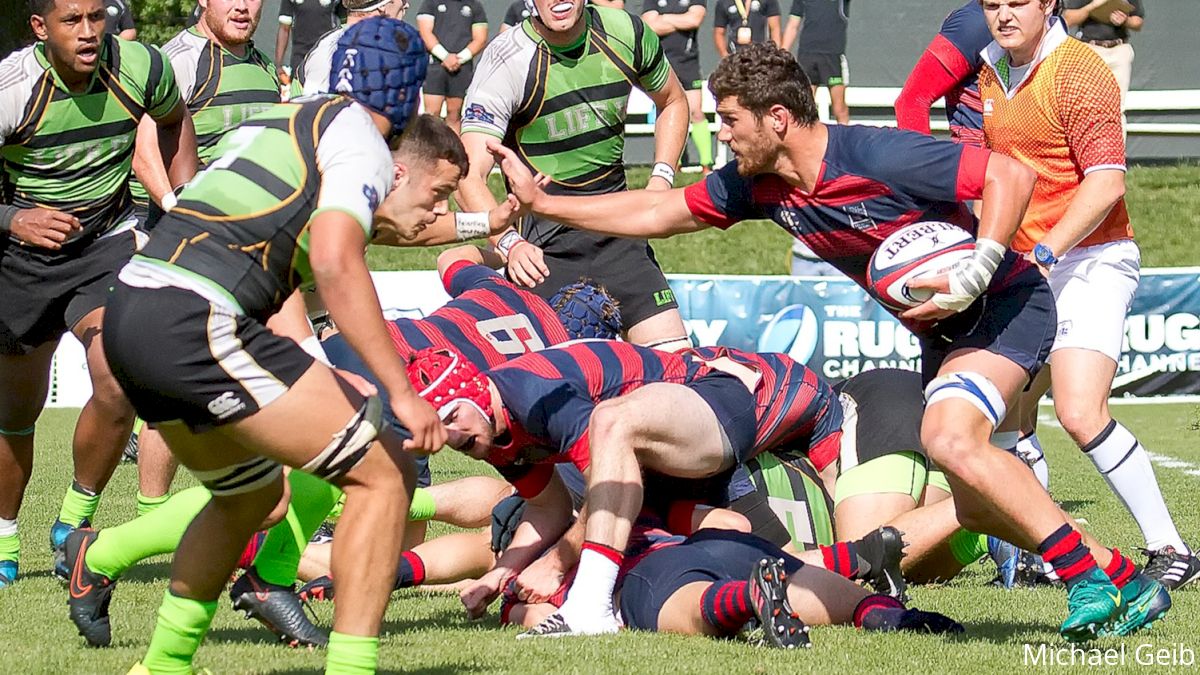D1A Teams Meet, Make Changes
D1A Teams Meet, Make Changes
A look at the upcoming changes for College D1A rugby conferences and teams.

Coaches and league reps from men's D1A college conferences met late last month in what those attending said was perhaps the best-toned, most constructive meeting the group has ever had.
D1A is set to sign some deals to get more media exposure on a national basis, but perhaps more telling was that many teams sent representatives to the meeting. The presence of USA Rugby CEO Dan Payne, someone who has coached at the D1A level, was important to everyone.
In addition, the D1A is clamping down on teams that fail to submit proper game reports and use USA Rugby's online competition management system. The division is also holding teams to a waiver deadline. Reports are that a large proportion of waiver requests (usually for players who needed an eligibility waiver) were filed after the season was completed. This won't fly going forward, as teams now have a deadline (mid-October or mid-February, depending on when the team in question starts play). All waiver requests filed after the deadlines will result in automatic denial.
D1A coaches (head coaches and assistants) will be required to attain Level 300 certification. Coaches without that certification will have a year in which to get it. The conferences are now expected to host certification courses to make this easier.
The division also has formed committees for budget, competitions, disciplinary, and eligibility. There is also an oversight committee that will look at the bigger picture and review the performance of the commissioner (who is currently Kevin Battle). On that oversight committee is Dan Payne, Tom Rooney (Ohio State, Big Ten), Paul Keeler (Santa Clara, California Conference), Teshay Flowers (TCU, Red River Conference), Tim O'Brien (Saint Mary's, California Conference), and Colton Cariaga (Life University, Mid-South).
It is telling that Payne is on the oversight committee, and most agree that his involvement (compared to previous CEO Nigel Melville's less enthusiastic attention) is a good development.
Playoffs
Two notable developments for the playoffs (almost) came out of the meeting. The first is that conference champions will no longer be guaranteed a home playoff game - or so the news was coming out of the meeting. However, since the meeting that's been changed. Conference winners still get their home game.
And that's because ... the playoffs are expected to expand to 16 teams, from the previous system, which saw 12 teams play, with four of those teams getting a bye to the second round. Since the playoffs already run four weeks, adding four more teams doesn't extend the playoffs. It does, however, perhaps settle some rankings arguments, offering a chance for teams that felt they were ranked too low to prove themselves.
D1A is set to sign some deals to get more media exposure on a national basis, but perhaps more telling was that many teams sent representatives to the meeting. The presence of USA Rugby CEO Dan Payne, someone who has coached at the D1A level, was important to everyone.
Self-Determination
The key development appears to be coaches and teams taking more ownership of how the division is operated. The teams are now running an audit of finances that were handled by USA Rugby in the past three years. That audit will be overseen by Santa Clara head coach Paul Keeler, whose job it is to find out if USA Rugby owes the league money.In addition, the D1A is clamping down on teams that fail to submit proper game reports and use USA Rugby's online competition management system. The division is also holding teams to a waiver deadline. Reports are that a large proportion of waiver requests (usually for players who needed an eligibility waiver) were filed after the season was completed. This won't fly going forward, as teams now have a deadline (mid-October or mid-February, depending on when the team in question starts play). All waiver requests filed after the deadlines will result in automatic denial.
D1A coaches (head coaches and assistants) will be required to attain Level 300 certification. Coaches without that certification will have a year in which to get it. The conferences are now expected to host certification courses to make this easier.
The division also has formed committees for budget, competitions, disciplinary, and eligibility. There is also an oversight committee that will look at the bigger picture and review the performance of the commissioner (who is currently Kevin Battle). On that oversight committee is Dan Payne, Tom Rooney (Ohio State, Big Ten), Paul Keeler (Santa Clara, California Conference), Teshay Flowers (TCU, Red River Conference), Tim O'Brien (Saint Mary's, California Conference), and Colton Cariaga (Life University, Mid-South).
It is telling that Payne is on the oversight committee, and most agree that his involvement (compared to previous CEO Nigel Melville's less enthusiastic attention) is a good development.
Playoffs
Two notable developments for the playoffs (almost) came out of the meeting. The first is that conference champions will no longer be guaranteed a home playoff game - or so the news was coming out of the meeting. However, since the meeting that's been changed. Conference winners still get their home game.And that's because ... the playoffs are expected to expand to 16 teams, from the previous system, which saw 12 teams play, with four of those teams getting a bye to the second round. Since the playoffs already run four weeks, adding four more teams doesn't extend the playoffs. It does, however, perhaps settle some rankings arguments, offering a chance for teams that felt they were ranked too low to prove themselves.